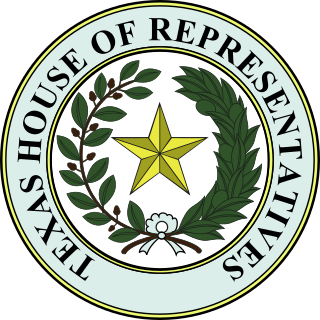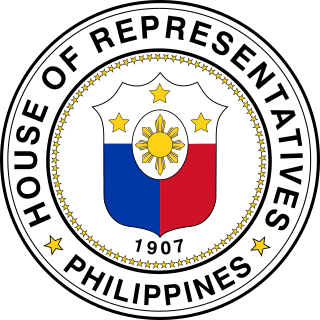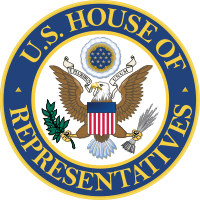
The speaker of the United States House of Representatives, commonly known as the speaker of the House, is the presiding officer of the United States House of Representatives. The office was established in 1789 by Article I, Section II, of the U.S. Constitution. By custom and House rules, the speaker is the political and parliamentary leader of the House and is simultaneously its presiding officer, de facto leader of the body's majority party, and the institution's administrative head. Speakers also perform various other administrative and procedural functions. Given these several roles and responsibilities, the speaker usually does not personally preside over debates—that duty is instead delegated to members of the House from the majority party—nor regularly participate in floor debates.
Contempt of Congress is the act of obstructing the work of the United States Congress or one of its committees. Historically, the bribery of a U.S. senator or U.S. representative was considered contempt of Congress. In modern times, contempt of Congress has generally applied to the refusal to comply with a subpoena issued by a congressional committee or subcommittee—usually seeking to compel either testimony or the production of requested documents.

The Georgia General Assembly is the state legislature of the U.S. state of Georgia. It is bicameral, consisting of the Senate and the House of Representatives.

The United States House Committee on Appropriations is a committee of the United States House of Representatives that is responsible for passing appropriation bills along with its Senate counterpart. The bills passed by the Appropriations Committee regulate expenditures of money by the government of the United States. As such, it is one of the most powerful committees, and its members are seen as influential.

The United States Senate Committee on Appropriations is a standing committee of the United States Senate. It has jurisdiction over all discretionary spending legislation in the Senate.

The Texas House of Representatives is the lower house of the bicameral Texas Legislature. It consists of 150 members who are elected from single-member districts for two-year terms. There are no term limits. The House meets at the State Capitol in Austin.
Congressional staff are employees of the United States Congress or individual members of Congress. The position first developed in the late 19th century, and it expanded significantly during the 20th century. Staffers may work with individual members of Congress, or they may be associated with committees or other organizations that support Congress.

Thomas Jeffery Cole is the U.S. representative for Oklahoma's 4th congressional district, serving since 2003. He is a member of the Republican Party and serves as the chairman of the House Appropriations Committee. Before serving in the House of Representatives, he was the 26th Secretary of State of Oklahoma from 1995 to 1999.

The 39th United States Congress was a meeting of the legislative branch of the United States federal government, consisting of the United States Senate and the United States House of Representatives. It met in Washington, D.C., from March 4, 1865, to March 4, 1867, during Abraham Lincoln's final month as president, and the first two years of the administration of his successor, Andrew Johnson.

The Utah State Legislature is the state legislature of the U.S. state of Utah. It is a bicameral body, comprising the Utah House of Representatives, with 75 state representatives, and the Utah Senate, with 29 state senators. There are no term limits for either chamber.

The speaker of the House of Representatives of the Philippines, more popularly known as the House speaker, is the presiding officer and the highest-ranking official of the lower house of Congress, the House of Representatives, as well as the fourth-highest official of the government of the Philippines.
Title 2 of the United States Code outlines the role of Congress in the United States Code.
U.S. Senate Appropriations Subcommittee on Legislative Branch is one of twelve subcommittees of the U.S. Senate Committee on Appropriations. The United States Senate Committee on Appropriations has joint jurisdiction with the United States House Committee on Appropriations over all appropriations bills in the United States Congress. Each committee has 12 matching subcommittees, each of which is tasked with working on one of the twelve annual regular appropriations bills.

The 116th United States Congress was a meeting of the legislative branch of the United States federal government, composed of the Senate and the House of Representatives. It convened in Washington, D.C., on January 3, 2019, and ended on January 3, 2021, during the final two years of Donald Trump's presidency. Senators elected to regular terms in 2014 finished their terms in this Congress, and House seats were apportioned based on the 2010 census.

The United States House of Representatives is the lower chamber of the United States Congress, with the Senate being the upper chamber. Together, they comprise the national bicameral legislature of the United States. The House is charged with the passage of federal legislation, known as bills; those that are also passed by the Senate are sent to the president for signature or veto. The House's exclusive powers include initiating all revenue bills, impeaching federal officers, and electing the president if no candidate receives a majority of votes in the Electoral College.
The Constitution of the Philippines is the constitution or the supreme law of the Republic of the Philippines. Its final draft was completed by the Constitutional Commission on October 12, 1986, and ratified by a nationwide plebiscite on February 2, 1987.

Procedures of the United States Congress are established ways of doing legislative business. Congress has two-year terms with one session each year. There are rules and procedures, often complex, which guide how it converts ideas for legislation into laws.
The Bipartisan Legal Advisory Group (BLAG) has been a standing body of the U.S. House of Representatives since 1993 that directs the activities of the House Office of General Counsel. BLAG can direct the General Counsel to participate in litigation or file an amicus curiae brief in cases involving the interests of the House or BLAG can call for legislation or a House resolution authorizing the General Counsel to represent the House itself. BLAG comprises five members of House leadership:

The impeachment trial of Andrew Johnson, 17th president of the United States, was held in the United States Senate and concluded with acquittal on three of eleven charges before adjourning sine die without a verdict on the remaining charges. It was the first impeachment trial of a U.S. president and was the sixth federal impeachment trial in U.S. history. The trial began March 5, 1868, and adjourned on May 26.
In the United States Congress, a bill is proposed legislation under consideration by either of the two chambers of Congress: the House of Representatives or the Senate. Anyone elected to either body can propose a bill. After both chambers approve a bill, it is sent to the President of the United States for consideration.













